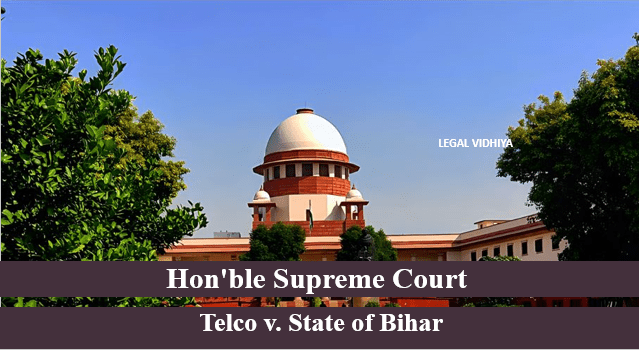
CASE ANALYSIS- Telco v. State of Bihar
| Case Name: | Tata Engineering and Locomotive v. State of Bihar and Others |
| Citation: | 1965 AIR 40, 1964 SCR (6) 885 |
| Date of Judgement: | 25 February 1964 |
| Court: | Supreme Court of India |
| Petitioner: | Tata Engineering and Locomotive Co. Ltd |
| Respondent: | State of Bihar and Others |
| Bench: | Gajendragadkar, P.B. (CJ), Wanchoo, K.N.Shah, J.C.Ayyangar, N. RajagopalaSikri, S.M |
| Referred: | Article 32Article 19Article 286(1)(a) |
| Keywords: | Fundamental Rights, Lifting of the Corporate Veil. |
Facts of the Case:
- Tata Engineering and Locomotive Co. Ltd. is a company registered under the Indian Companies Act, 1913 and is involved in the business of manufacturing of trucks, diesel and spare parts. The company sells products to dealers and conducts their business all over India.
- In order to sells products/vehicles to dealers, the petitioner enters into Dealership agreements. For this particular case, they claim that it was an inter-state trade and thus is not liable under the Sales Tax Act.
- The Sales-Tax Officer claimed that the trade happened in Bihar and was liable for assessment.
- The calculations of the sales tax are also under threat for recovery.
- The petitions were filed in the name of the corporation and all the members of the company are citizens of India.
- The doctrine of corporate veil was also examined.
- Article 32- Right to move the Supreme Court for enforcement of rights.
- Article 19- Right to freedom of speech and expression.
- Article 286(1)(a)- The State shall not impose taxes on the course of transaction of goods if it is outside the State.
Issues Raised
1. Whether the position of the corporation can be considered as a citizen?
2. Whether the petition under Article 32 by the corporation is competent to claim Article 19?
3. Whether in the present case it is necessary to pierce the Corporate Veil?
Contentions of the Petitioner
- The petitioners stated that the transactions happened outside the State of Bihar and that the sales tax was not applicable on them under Article 286(1)(a).
- They also stated that the shareholders must be allowed to file the petitions on the ground that corporations/companies are nothing but an association of shareholders and other members.
- They also contested that the transactions did not satisfy the criteria under the Central Sales Tax Act, 1956.
Contentions of the Respondents
- A preliminary objection raised by the respondents was that the petitions filed by the petitioners were not competent as companies/corporations are not citizens and cannot plead for a violation of a fundamental right.
- A company is a legal entity and is different from that of its shareholders.
- It was decided to dismiss the petition.
Judgement
The Supreme Court analyzed the nature of transactions that were conducted. The petitions under Article 32 were held incompetent. Article 19 which is a fundamental right is guaranteed to the citizens of India and does not cover the ambit of companies/corporations. Any violation of the fundamental right is against the State and therefore, in terms of any business of the company is a matter of the corporation. The internal business of a company is not the concern of the citizens. The petitioner’s contention of filing a petition cannot be held competent. Though the company has a legal entity of its own, it is entirely separate from its members and shareholders. The lifting of the corporate veil is also not necessary in the present case. The petitioner’s plea under Article 19(1)(g) and Article 32 is not strong enough to invoke the piercing of the corporate veil. The objection raised by the respondent was upheld and the petition was dismissed.
Conclusion
This case is considered as a landmark judgement regarding the concept of ‘tax and sales’ and its applicability. It also helped to provide a distinction between the citizens and the corporation in terms of the applicability of the fundamental rights. It also prevented the unnecessary lifting of the corporate veil. The Court upheld the sanctity of the matters of a corporation and considered the length of argument by the petitioners. The pleadings were not strong enough to take any concrete action.
written By Sama Amin a student of Amity University, Dubai, 6th Semester, an intern under Legal Vidhiya.




0 Comments